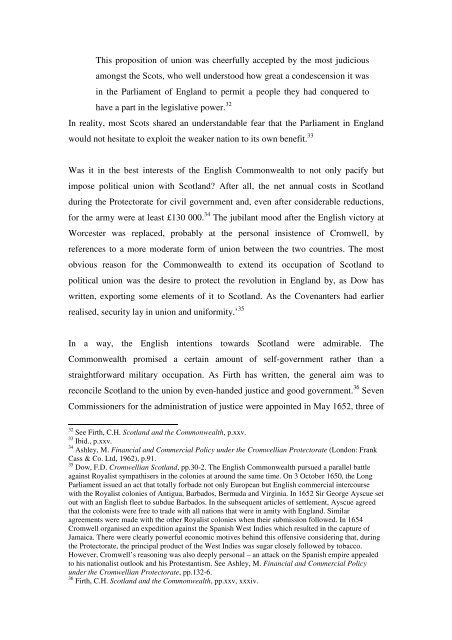The Glencairn Uprising, 1653-54 Helen Baker Department of ...
The Glencairn Uprising, 1653-54 Helen Baker Department of ...
The Glencairn Uprising, 1653-54 Helen Baker Department of ...
You also want an ePaper? Increase the reach of your titles
YUMPU automatically turns print PDFs into web optimized ePapers that Google loves.
This proposition <strong>of</strong> union was cheerfully accepted by the most judicious<br />
amongst the Scots, who well understood how great a condescension it was<br />
in the Parliament <strong>of</strong> England to permit a people they had conquered to<br />
have a part in the legislative power. 32<br />
In reality, most Scots shared an understandable fear that the Parliament in England<br />
would not hesitate to exploit the weaker nation to its own benefit. 33<br />
Was it in the best interests <strong>of</strong> the English Commonwealth to not only pacify but<br />
impose political union with Scotland? After all, the net annual costs in Scotland<br />
during the Protectorate for civil government and, even after considerable reductions,<br />
for the army were at least £130 000. 34 <strong>The</strong> jubilant mood after the English victory at<br />
Worcester was replaced, probably at the personal insistence <strong>of</strong> Cromwell, by<br />
references to a more moderate form <strong>of</strong> union between the two countries. <strong>The</strong> most<br />
obvious reason for the Commonwealth to extend its occupation <strong>of</strong> Scotland to<br />
political union was the desire to protect the revolution in England by, as Dow has<br />
written, exporting some elements <strong>of</strong> it to Scotland. As the Covenanters had earlier<br />
realised, security lay in union and uniformity.’ 35<br />
In a way, the English intentions towards Scotland were admirable. <strong>The</strong><br />
Commonwealth promised a certain amount <strong>of</strong> self-government rather than a<br />
straightforward military occupation. As Firth has written, the general aim was to<br />
reconcile Scotland to the union by even-handed justice and good government. 36 Seven<br />
Commissioners for the administration <strong>of</strong> justice were appointed in May 1652, three <strong>of</strong><br />
32 See Firth, C.H. Scotland and the Commonwealth, p.xxv.<br />
33 Ibid., p.xxv.<br />
34 Ashley, M. Financial and Commercial Policy under the Cromwellian Protectorate (London: Frank<br />
Cass & Co. Ltd, 1962), p.91.<br />
35 Dow, F.D. Cromwellian Scotland, pp.30-2. <strong>The</strong> English Commonwealth pursued a parallel battle<br />
against Royalist sympathisers in the colonies at around the same time. On 3 October 1650, the Long<br />
Parliament issued an act that totally forbade not only European but English commercial intercourse<br />
with the Royalist colonies <strong>of</strong> Antigua, Barbados, Bermuda and Virginia. In 1652 Sir George Ayscue set<br />
out with an English fleet to subdue Barbados. In the subsequent articles <strong>of</strong> settlement, Ayscue agreed<br />
that the colonists were free to trade with all nations that were in amity with England. Similar<br />
agreements were made with the other Royalist colonies when their submission followed. In 16<strong>54</strong><br />
Cromwell organised an expedition against the Spanish West Indies which resulted in the capture <strong>of</strong><br />
Jamaica. <strong>The</strong>re were clearly powerful economic motives behind this <strong>of</strong>fensive considering that, during<br />
the Protectorate, the principal product <strong>of</strong> the West Indies was sugar closely followed by tobacco.<br />
However, Cromwell’s reasoning was also deeply personal – an attack on the Spanish empire appealed<br />
to his nationalist outlook and his Protestantism. See Ashley, M. Financial and Commercial Policy<br />
under the Cromwellian Protectorate, pp.132-6.<br />
36 Firth, C.H. Scotland and the Commonwealth, pp.xxv, xxxiv.
















